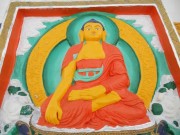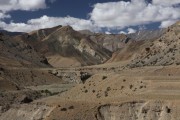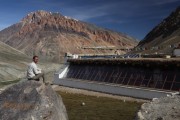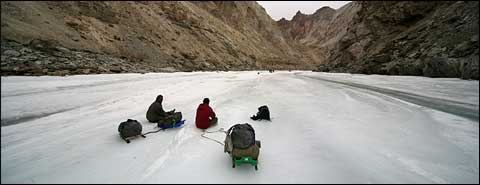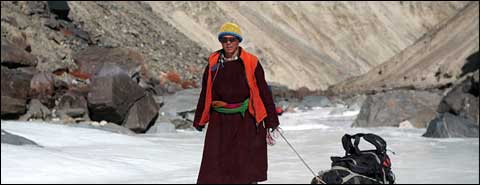The Surya Team on the edge after finishing its mission
From the latest news it was stated that the Surya Civic Association had set off with optimism on the journey across the frozen river to the village of Kargyak. The guys had gone through a crucial trial needing every ounce of their physical strength. As a reward for this journey, just when they were on the brink of physical exhaustion, they received a warm welcome from the villagers and 50 children signed up for school attendance. Thanks to the Czech volunteers, the school in Kargyak will be opened in October this year.
Journeying across the frozen river from the Ladhak capital Leh, they arrived in Padum. From there the men set off on the snow-covered road accompaigned by two Kargyak men Spalgi and Dorje. It was not possible to get there by car as recent avalanches had covered snow over the area. Although Tomas Vavra, the cameraman, was on antibiotics due to persisting health problems, he bravely soldiered on and continued filming.
After a night spent in Rar, the team set off heading to the secluded Zangdan, where they had stayed overnight before with an elderly villager last summer when visiting Kargyak. The route more or less follows the frozen river across the ice. We met men pulling wood on a sledge and later on we saw our timber for building the school, noted Jára Pechacek's diary. Most of the load is stored safely at the final destination. However, the remains mean a lot of work for the team of thirty men for the next three days. Rather than utilizing horses or yaks the beams were pulled across the ice by the men. "I think my next project will be a document instructing how to harness the animals for the transport of heavy loads," laughed Honza Tilinger, the Chief Team Member.
"The ice was not perfect everywhere and along the way we fell in, floundered, waded, slumped, slipped several times or chose to climb over the rocks instead. The last part of the Chadar was a thirty meters long, very steep accent on the rocky surface up from the river bed. Although the sun had already set, everybody managed it safely supported with a rope," Jára commented. That was a really tough part. An old man from a secluded cottage made a typical local meal for the exhausted team - rice with bean soup (dhall). "We are used to eating this simple meal here every day but this time we were really starving and the grandpa made it really delicious," said Honza, praising the man.
After a freezing night on the floor of a stone hut, the guys set off on the last part of their journey to Kargyak. It was an audacious plan - they went without rest until reaching the village. The villagers welcomed them with great hospitality and indulged them with lots of barley beer and small yak meat balls called momo. "The whole village was in our room celebrating and there we were in the middle of it all nearly half dead from exhaustion, muses Jára about the return to the village after five months.
The team stayed in the village for three days. As rumors about the school began to spread quickly across the region, the men were besieged by many enthusiastic parents, even those from neighboring settlements, seeking for their children to be signed up to a class. "We said to all: If you help us with building the school, we will sign your kid up." Some of the villagers were surprised at this: "How come? You are the white men. Aren't you here to build the school for us?" as Jára describes. It snowed a lot and it was very windy throughout our stay there.
The way back from Kargyak to Padum was the most demanding part that awaited the team through the Himalayan winter. There was a lot of snow everywhere, the wind was freezing and it was very difficult to walk on the ice. The way back took them four days of unbelievable effort - three of the four team members suffered from serious stomach problems. Their health was affected not only by the long lasting extreme environment but also by a lack of nutritious food. "Although we were supplied with vitamins, Czech salami, chocolate bars and instant noodle soups, the extreme physical drain and sparse air make even a well trained body close to collapse," said Honza describing the critical situation.
With great strain, the team managed to reach Padum. Even though they could now rest, the inability to take in drinks and food remained. Because of this, a helicopter came to take them to Leh, the capital of Ladhak. "There is no hot water or toilet in Leh's hospital," adds Honza describing the situation. However, they were no longer in a critical condition due to the care provided by the hospital.
Consequently, the cameraman Tomas and another member of the team, Lukas, flew back to Dilli and from there back to the Czech Republic. Honza and Jára stayed in India because there were several things to arrange as far as building the school was concerned. Currently there is only one more month to go until the villagers start digging the foundations.

 In now days are hppening big changes in Jammu and Kashmir.
https://www.bbc.com/news/world/asia/india
In now days are hppening big changes in Jammu and Kashmir.
https://www.bbc.com/news/world/asia/india  On September 21st, Kargyak Sun School will celebrate the 10th anniversary of its opening. There, in one of the last places on Earth, the original Tibetan culture survives at the elevation of 4200 m. Before the school opened, the village of 200 heads had only 10 members who could read and write a little. To get an education, children were sent away to boarding schools in faraway towns. Today, the Sun School has its alumni and thanks to the project, people stopped moving away from the village.
On September 21st, Kargyak Sun School will celebrate the 10th anniversary of its opening. There, in one of the last places on Earth, the original Tibetan culture survives at the elevation of 4200 m. Before the school opened, the village of 200 heads had only 10 members who could read and write a little. To get an education, children were sent away to boarding schools in faraway towns. Today, the Sun School has its alumni and thanks to the project, people stopped moving away from the village.  PRAHA 22.11.2018 | 19:00 Betlémská kaple
BRNO 21.11.2018 | 19:00 Milosrdní bratři
PRAHA 22.11.2018 | 19:00 Betlémská kaple
BRNO 21.11.2018 | 19:00 Milosrdní bratři 